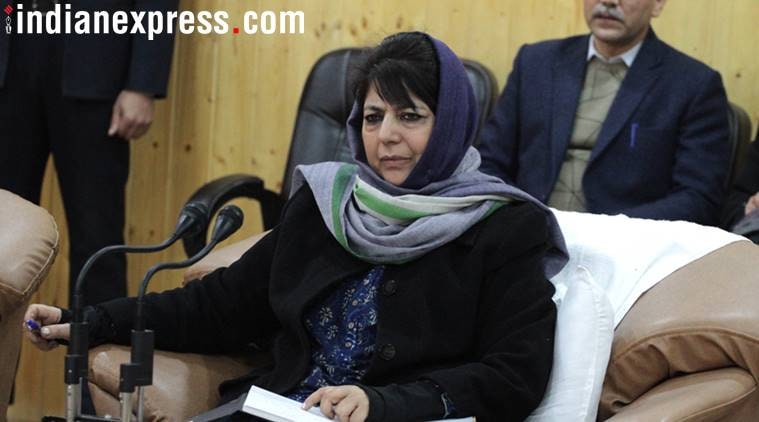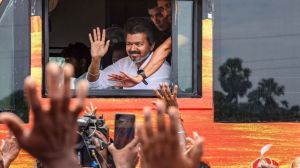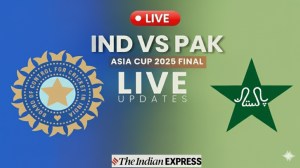Stay updated with the latest - Click here to follow us on Instagram
Showing the door: Gaps that could not be bridged between BJP-PDP
When they joined hands, they called it coming together of the North and South Pole. As BJP and PDP finally part ways, ARUN SHARMA explores the gaps that could not be bridged and what the two parties take away.
 Then Jammu and Kashmir chief minister Mehbooba Mufti at prime minister office after meeting with Narendra Modi in New Delhi in 2016. (Express Photo by Anil Sharma)
Then Jammu and Kashmir chief minister Mehbooba Mufti at prime minister office after meeting with Narendra Modi in New Delhi in 2016. (Express Photo by Anil Sharma)
Ahead of the last phase of the Assembly elections in Jammu and Kashmir in December 2014, when Prime Minister Narendra Modi had appealed to people at Maulana Azad Stadium in Jammu to make sure that the ballot boxes of the Congress, National Conference and PDP were found empty on counting day, from Rajouri to Kathua, people had responded in kind. The BJP had won 18 of the total 22 constituencies in these two districts predominantly inhabited by Hindus, adding seven more seats from Chenab Valley region and Udhampur district, with significant Hindu populations.
As the BJP pulls out of its very first government in a state that is central to its nationalism project, one reason is the brewing anger in this region that steered it to power. With Jammu’s long-lasting complaint being that it often goes unheard in the noise of Kashmir, the BJP, having already stunned its base by aligning with the diametrically opposite PDP — seen as soft separatist, with most of its 28 Assembly seats in Kashmir — could hardly turn a deaf ear.
‘Special status’ of state
Rajiv Chuni, the chairman of SOS International, who works with West Pakistan refugees, says the promise of abrogation of Articles 370 and 35-A was one of the “prime reasons” they voted for the BJP in 2014. In Jammu, there is a demand to junk the two provisions to ensure “complete merger of the state”.
However, after coming to power, the BJP maintained silence over the issue. It was also seen as weak when Article 35-A came up before the Supreme Court. The state government opposed the PIL by a RSS-linked group challenging the validity of Article 35-A, and the Centre dithered, in what was seen as capitulation of the BJP before the PDP.
Warning against attempts to interfere with Article 35-A, CM Mufti said there won’t be anyone to even shoulder the national tricolour in the state should that happen. The debate over the state’s special status also played out over the GST. The BJP wanted J&K to be included as part of the Central tax. The Act couldn’t, however, be automatically extended to the state because it violated provisions of Article 370 as well as J&K’s own constitution. Under pressure from the BJP, then Mehbooba government agreed to accept the law a week after it was made applicable across the country. However, for its constituency, the PDP highlighted “two riders” that it said gave some concessions to the state.
Senior BJP leader Kavinder Gupta, who had a short-lived stint as Deputy Chief Minister before the government fell, points out that during one of his rallies in the 2014 Assembly campaign, Modi had said there should at least be public discussion on the benefits of Article 370. “Let there be such a discussion in the public discourse,” Kavinder Gupta asserts.
Read | Amit Shah in J&K: Mehbooba govt discriminated against Jammu and Ladakh regions
 Warning against attempts to interfere with Article 35-A, CM Mufti said there won’t be anyone to even shoulder the national tricolour in the state should that happen. (Express Photo by Tashi Tobgyal)
Warning against attempts to interfere with Article 35-A, CM Mufti said there won’t be anyone to even shoulder the national tricolour in the state should that happen. (Express Photo by Tashi Tobgyal)
Anti-militancy operations
Since the alliance broke, the BJP has been saying that while it wanted “a free hand” to security forces in dealing with militants, the PDP was hesitant, given its political constituency, and stuck to demands such as withdrawal of the contentious Armed Forces (Special Powers) Acts.
With the security situation in Kashmir deteriorating, it was becoming difficult for the BJP to justify what it saw as “concessions” in Kashmir, like the recent ceasefire and amnesty to stone-pelters. The registration of an FIR against an army personnel engaged in counter-terror operations in January 2018 was another flashpoint, with the BJP protesting in the Assembly on the matter.
Soon after the government fell, there were voices from security quarters that a crackdown would follow, with the BJP blaming the PDP, that held the Home portfolio, of “not allowing things needed to tackle the situation” earlier. BJP national general secretary Ram Madhav also accused the state government of failing to control terrorism and radicalisation.
Calling the Army a “very responsible organisation”, Kavinder Gupta says, “If terror in Kashmir has to be tackled, the Army has to have a role.” He said talks with Pakistan and the separatists could wait. “Let Pakistan first ask for talks and then India can think of it.” The PDP, which knows the thin ice it is treading from now on to polls, has been careful in its response to these charges. Leaders have been pointing out the measures taken by the Centre towards peace, and saying these were “on the PDP’s suggestions”.
This was evident in the first remarks by Mehbooba after the government’s fall. If the BJP had hours earlier listed the failures of the government led by her, she chose to highlight the “achievements” — including “protecting Article 370”, “amnesty to stone-pelters”, “getting PM Modi to visit Lahore”, “getting Union Home Minister Rajnath Singh to appeal for dialogue”, and “suspension of operations during Ramzan”.
 Former chief minister Mehbooba Mufti lays the wreath on the coffin of the slain police officer Mohammed Ayoub Pandit during the funeral procession in Srinagar. (Express Photo by Shuaib Masoodi)
Former chief minister Mehbooba Mufti lays the wreath on the coffin of the slain police officer Mohammed Ayoub Pandit during the funeral procession in Srinagar. (Express Photo by Shuaib Masoodi)
Speaking to The Sunday Express, PDP spokesperson Waheed ur Rehman Para reiterates this, adding that it is “the other side”, in a reference to separatists, militants and Pakistan, that is to blame for what has come to pass. “The Centre took all those initiatives we requested them so as to have peace in the Valley… They did not ditch us, but responded by appointing an interlocutor and Prime Minister Modi went to Pakistan… However, the entire process got destabilised as the other side did not respond when the interlocutor came. Unilateral ceasefire came, but they did not respond… In a way, every effort got sabotaged.”
Para also acknowledged that for the BJP, these were difficult choices. “All these points were in the Agenda of Alliance, and we tried to implement them. It was very difficult to get the BJP on board on amnesty and Article 35-A, but they did….” Where the Centre, or the BJP, got it wrong, Para adds, is in expecting quick fixes. “The real challenge was to survive these initiatives,” the PDP leader says. “Not backtrack because of some attack… You do not wind up a process…, just because others do not want it to work.”
Refugees from West Pakistan
One of the poll promises made by the BJP was providing “right to livelihood” to refugees, largely Hindus, who had migrated during Partition from what would become Pakistan Occupied Kashmir. Recently the Central government announced that 31,619 such families would get Rs 5.5 lakh each.
Chuni says this is peanuts, adding that as per the ‘D-Form’ filled up by displaced families at the time of their migration from PoK, listing the moveable and immovable properties left behind by them, many had mentioned value of their property at Rs 25,000 and above during 1947. SOS International has been seeking one-time relief of Rs 50 lakh to each family, while the previous Omar Abdullah government had recommended to the Centre that the families get Rs 25 lakh each.
While the PDP-BJP government had started issuing “identity certificates” initially to facilitate recruitment of such refugees in Central police organisations and security forces, this had been stopped following an uproar in the Valley. Separatists and others denounced the move as a “conspiracy to change the demography of the state”.
Para says they never objected to the issue of ID cards, but asks, “Can a non-state subject be issued a permanent resident certificate? This is what they (the BJP) wanted.” Raina says the BJP will now press for grant of all fundamental rights and privileges to West Pakistan refugees, adding they are “Indian nationals”. The issue of Rohingya refugees also played out along similar religious and regional lines in the state. Protesters in Jammu called the settlement of the Muslim refugees as an attempt to, in turn, change Hindu-majority Jammu’s demography.
 Mehbooba Mufti (Express Photo by Shuaib Masoodi)
Mehbooba Mufti (Express Photo by Shuaib Masoodi)
The BJP has been asking the Union Home Ministry to tell the state government to identify Rohingya refugees and prevent any fresh influx. Kavinder Gupta says this was one of the issues they raised with Rajnath Singh during his recent visit to the state. The PDP’s Waheed Para says it is wrong to blame the Mufti government for this, adding that the Rohingya have been in Jammu much before its term. How are the Rohingya connected with Kashmir, he asks, adding that if the Centre wants to remove them, it should. “However, as long as they are not a threat to anybody, we are not against anybody.”
Government jobs
In 2017, the J&K State Public Service Commission came out with a list of selected candidates after the Civil Services (Judicial) competitive examination. Only one of the five candidates selected under the general category was from the Jammu region. Even that candidate was the daughter of a sitting BJP minister. Two of the three candidates selected under the backward area category were also from Kashmir.
The matter led to raised tempers in Jammu, with BJP leaders raising questions over the selection criteria and endorsing the demand for bifurcation of the Public Service Commission on regional lines.
Again, in 2017, of the 642 constable operators selected in general category in the state, only 103 happened to be from the Jammu region. Earlier all the newly sanctioned 10,000 posts of SPOs were assigned to various districts in Kashmir. After the fall of the government, BJP leaders said all these complaints related to departments held by PDP ministers, while their party ministers had ensured “justice to all the three regions of the state”. At his press conference announcing split, Ram Madhav said the state government had failed to address the impression of regional discrimination in developmental matters. “Resentment in Jammu and Ladakh regions has been growing over lack of proper development and progress,” he said.
Spokesperson Anil Gupta says, “Under the PM’s Mudra scheme, they gave loans to everybody in Kashmir, but were very strict in Jammu. Similarly, we wanted to make easy the process of issuance of state subjects, but they were not prepared for it.”
While the BJP wanted revenue officials to be empowered to issue the state subject certificates, to make the process easier, this was stalled under a Revenue Department controlled by the PDP.
Gupta adds that in the ‘Agenda of Alliance’, the BJP and PDP had resolved “not to press issues pertaining to their respective core ideologies”. “But she (Mufti) wanted to pursue the political part of the Agenda of Alliance and not the development part.” According to him, the pace of work on all the 108 projects launched by the Centre in the state had been “very, very slow” as “bureaucrats were directed to go slow”.
Of them, the 1,000 Mega Watt Pakal Dul hydel project was approved in October 2014 and scheduled to be commissioned in 2020. But it is now expected to be ready only by October 2023.
Kathua rape and murder
What was initially seen as a horrific rape and murder of an eight-year-old Bakarwal girl did more to drive a wedge along communal lines in the state, and the two ruling partners than any other issue. BJP ministers and leaders came in support of the accused, demanding CBI enquiry. The Mehbooba government dismissed the demand and instead let J&K police probe the case. The BJP had to drop two of its cabinet ministers, who had joined rallies in support of the accused.
 The PDP leader notes that the reasons the BJP cited also concern issues on which the two sides had differences from the beginning. (Express Photo)
The PDP leader notes that the reasons the BJP cited also concern issues on which the two sides had differences from the beginning. (Express Photo)
The 2019 factor
On June 7, when Union Home Minister Rajnath Singh entered a Srinagar stadium, a pleasant surprise awaited him. The state government had assembled several thousand youngsters, who stood up and cheered for the minister. For a change, the separatists did not call for a general strike in protest. When Singh spoke, he talked about the possibility of a “new dawn” in J&K.
Twelve days later, the BJP and PDP parted. In Kashmir, many PDP leaders believe that one reason could be that unusually warm Singh visit. While they insist in private that the BJP took the decision keeping in mind the 2019 elections, they also speculate that the BJP wanted to send a message to the Union Home Minister, who had made several conciliatory noises on Kashmir.

The PDP also credits Singh with convincing the BJP to go along with amnesty to stone-pelters and to offer the unconditional ceasefire for Ramzan. A PDP leader, who refuses to come on record, says, “The reasons given by the BJP (officially, for the break-up) are for public consumption. There is no doubt that the party intends to make the happenings inside Kashmir a poll issue in 2019. And they are right to conclude that we would be a hurdle in an all-out war on the streets here.”
The PDP leader notes that the reasons the BJP cited also concern issues on which the two sides had differences from the beginning. “What new has happened now?… Yes, we did push for extension of the… ceasefire because we were convinced it would help calm the situation…, but once the Centre decided otherwise, we
accepted it.”
Still, while the PDP never expected the alliance to last the full term, what came as a surprise was the timing. “We were expecting such a decision anytime after mid-August. This is why we were pushing for a few important programmes in the coming weeks, including a major employment scheme. That couldn’t be done.” The BJP hasn’t really hidden its hope that its actions in Kashmir would look rosier seen from the national prism — particularly as it enters the last stretch before the 2019 elections.
Anil Gupta says the tie-up with the PDP has exposed the other side. “We succeeded in showing up the Hurriyat as the PDP, despite being their political face in the Valley, could not oppose them.” He also sees the alliance as having given Jammu “a voice in the government for the first time”. The BJP also asserts that whatever its rivals may say, it has managed to broaden its base in Kashmir. Gupta cites their “six lakh membership in Kashmir”, and“party units in all the districts of the region”.
Read | PDP: Was ready to pull out before BJP but did not to avoid ‘traitor’ tag
 There could have been no better time to take this step than an election year, as it will only reaffirm the BJP’s commitment to its cadres.
There could have been no better time to take this step than an election year, as it will only reaffirm the BJP’s commitment to its cadres.
At his press conference, Ram Madhav said, “For the BJP, J&K is a matter of great national importance. There is grave concern… over the deteriorating security situation in the state. National integration is paramount for the BJP and it can’t compromise on that.”
A party leader admits, “Unlike the PDP, which is accountable only to the Valley, the BJP has countrywide accountability. We had to take a decision on that basis.”
An influential RSS functionary adds that “national considerations” had been playing on the minds of the BJP-RSS leadership for some time. “It (pulling out of the coalition) had to happen. The issue was of timing.” Another RSS leader says there could have been no better time to take this step than an election year, as it will only reaffirm the BJP’s commitment to its cadres and help the party play up its nationalistic image.
Union Minister Jitendra Singh, who belongs to Jammu, says what the BJP did was nothing less than what the people expected. “Whatever decision has been taken by the party leadership will prove to be in the best interests of the nation,” he says. As for the PDP, it cites the same Rajnath Singh visit, and the “6,000 youths” who turned up to listen to him, as a sign that change is possible. “We have been telling the BJP that there is a possibility to win over the youth… They are a potential threat, but we are trying to win the youth because we see the possibility,” Para says, adding, “There can be radicalisation, but if presence of government does not reduce it, then how will absence of government?”







